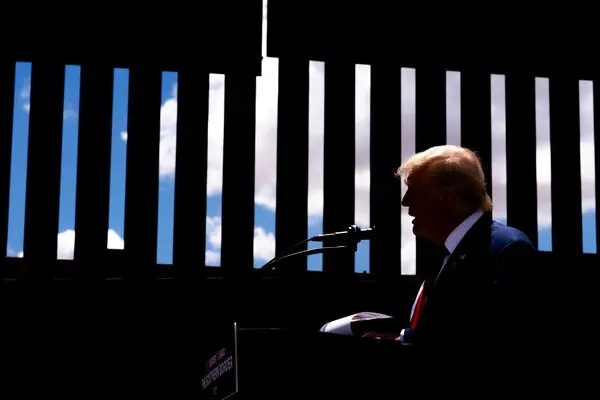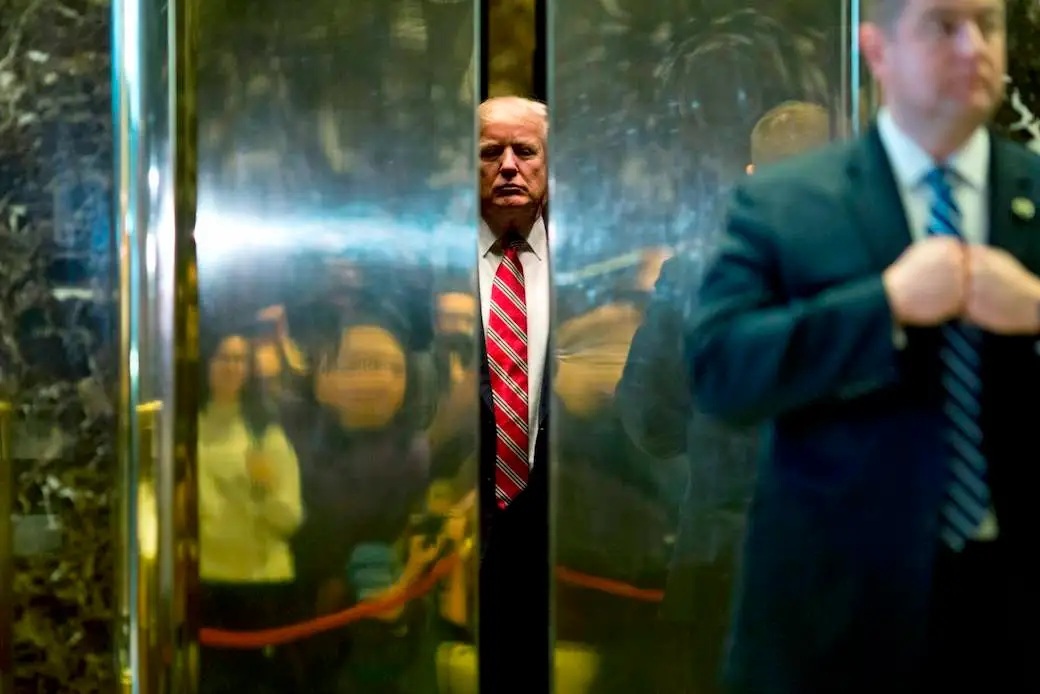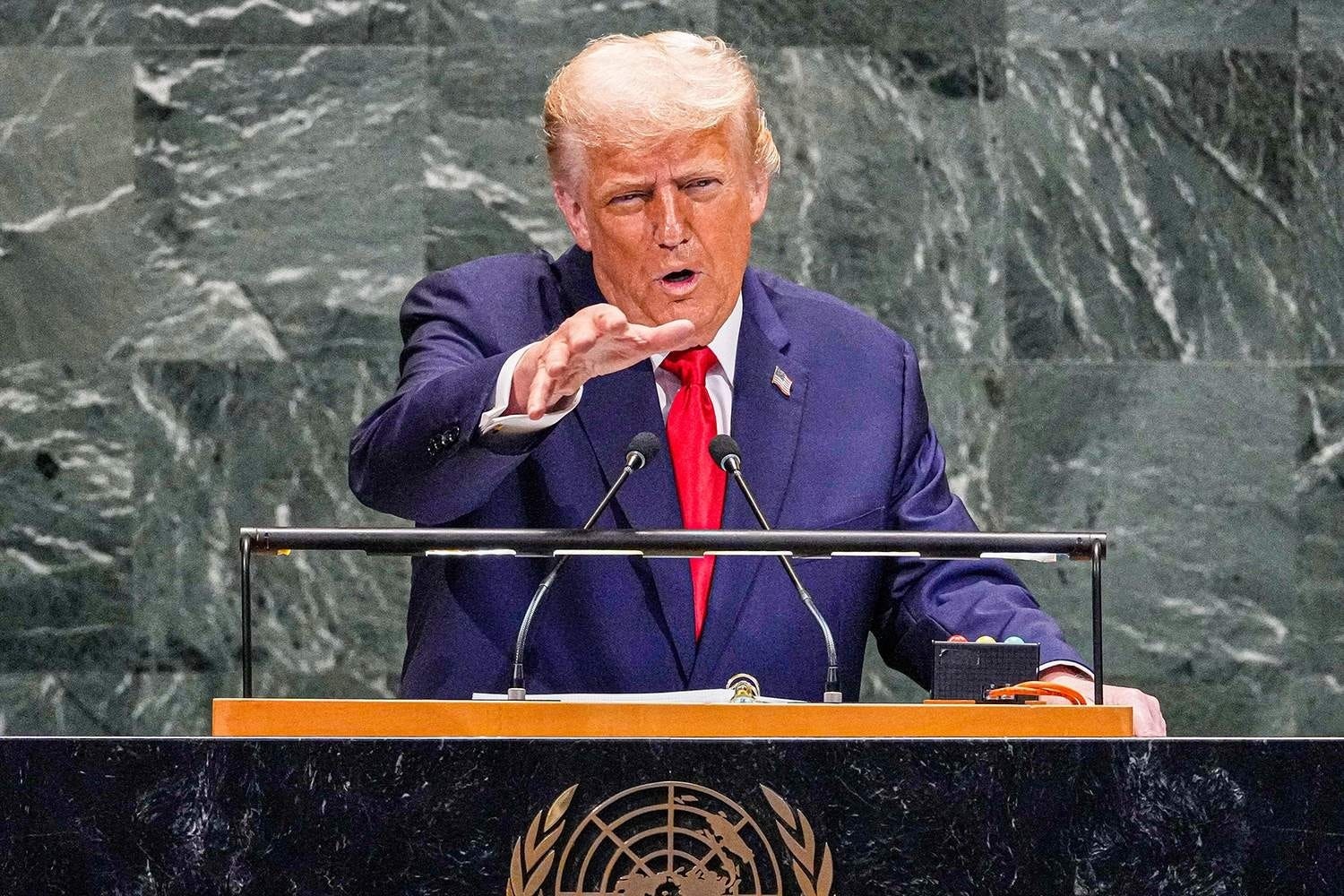Retreat of American Democracy Against Trump's Dictatorship
TEHRAN (Defapress) - In America's tumultuous autumn, the common thread in the country's recent domestic controversies is Donald Trump's effort to exert the untrammeled power of the presidency. These efforts, often described as unprecedented and exceeding the traditional boundaries of presidential authority, have cast a shadow not only domestically but also over foreign policy, raising profound concerns about a drift toward authoritarianism.

While Americans spend their weekend watching college football or enjoying the cool autumn air, Trump's power games are intensifying by the day, leading to two key confrontations at the White House: one over the deployment of forces to enforce hardline immigration policies in Portland, Oregon, and Chicago, and the other over increasing pressure to end the government shutdown. These conflicts, rooted in Trump's insatiable thirst for personal authority, have impacted nearly every aspect of his second term and heightened fears of authoritarianism's creeping influence.
The sequence of events began over the weekend when Trump, by executive order, dispatched 200 California National Guard troops to Oregon. This move came just days after a federal judge had blocked the deployment of Oregon's state reserve forces. The judge rejected Trump's characterization of Portland as a "war zone," dismissing the federal government's claims as exaggerated.
The judge emphasized that state and local officials would likely succeed in proving that Trump had overstepped his constitutional bounds and violated the Tenth Amendment. This ruling was not only a judicial setback for Trump but also symbolized growing resistance to his abuse of executive power.
Trump, who had earlier this year clashed with California's Democratic Governor Gavin Newsom over National Guard deployment in Los Angeles, was once again seeking alternative pathways to exert unchecked authority. Newsom, in a sharp statement, condemned the move, saying, "This has nothing to do with public safety. These actions are entirely about domestic political posturing. Trump, as Commander-in-Chief, is using the nation's military as a political weapon against American citizens."
This deployment was part of a broader pattern of Trump politicizing the military. Just days prior, he had gathered U.S. generals and admirals in Virginia and told them to use American cities as training grounds, adding that the armed forces should engage "domestic terrorists." These remarks, delivered at an event commemorating the 250th anniversary of the U.S. Navy, sparked fresh concerns about the politicization of the military.

In his speech, which resembled a campaign rally more than a formal address, Trump shouted, "We're sending the National Guard. We'll send whatever is necessary. People don't want this level of crime in their cities." So far, he has not directly defied judicial orders regarding these deployments, which he claims are necessary to combat "domestic terrorists," but legal experts warn that if he does, the country will face a genuine constitutional crisis.
This abuse of power extended beyond the West Coast to Chicago, where Trump authorized the deployment of the Illinois National Guard to protect Immigration and Customs Enforcement (ICE) offices, despite opposition from the state's Democratic Governor, J.B. Pritzker. This move came amid escalating tensions over hardline immigration policies. Pritzker, in an interview with CNN's Jake Tapper on "State of the Union," warned, "They are looking for a fight. They want to turn states into battlegrounds so they can deploy more forces."
These conflicts, in which Trump uses the military as a "political weapon against Americans," not only violate states' rights but also challenge the principles of the separation of powers. The Tenth Amendment, which reserves powers to the states, is a primary casualty, and the federal judge's ruling on Portland is a clear example of this violation.
On another front, as the escalating conflicts over state sovereignty intensified, Trump launched a new battle over the government shutdown. On Sunday, he threatened Democrats that if they did not vote for a short-term funding bill for federal operations until late November, he would furlough more federal employees. Democrats, under pressure from Trump for months, appear emboldened, using the only leverage they have in Washington, the 60-vote threshold to overcome a filibuster in the Senate.
Accordingly, Kevin Hassett, Chairman of the White House Council of Economic Advisers, told Tapper, "If the president decides negotiations are going nowhere, the furloughs will begin." However, the stopgap funding policy has so far prevented the mass furloughs of federal employees that the White House had previously suggested were imminent.

Republicans, facing public pressure and despite their long-standing aversion to the policy, have shown a conditional willingness to extend Obamacare subsidies in exchange for reopening the government. Republican House Speaker Mike Johnson said on NBC's "Meet the Press" on Sunday, "We need the uncertainty cleared up so everyone can do their jobs."
Furthermore, Secretary of Defense Pete Hegseth warned that a prolonged impasse would halt military pay and operations funding, thereby damaging national military readiness. In an interview with Fox News on Sunday, he said, "We will get the job done, whatever it is. But eventually, payments stop. Work stops. Training stops... Readiness for the mission will decrease."
However, such warnings seem almost ironic, as a key priority of the current administration appears to be shutting down large parts of the federal machinery. Such behavior only highlights the contradictory policies of the Trump administration.
Trump, in a conversation with a CNN reporter, expressed optimism, saying, "We're winning, and we're cutting costs dramatically!" However, recent polls show that voters primarily blame Trump and the Republicans, rather than Democrats, for the shutdowns. CNN's Adam Cancryn and Sarah Ferris reported on Friday that concerns within Trump's inner circle. One Trump advisor said, "I'm supposed to say this destroys the Democrats, but honestly, I don't think it helps either side."
Senate Majority Leader John Thune, on Fox News' "Sunday Morning Futures," said, "We are in a stalemate." He blamed Democrats for trying to use the government shutdown to force the cancellation of Medicaid cuts in Trump's massive domestic policy bill. However, the outlines of a potential deal to pass the Obamacare subsidy bill are clear, and moderate Democratic senators and those not seeking re-election could play a key role.

Trump's thirst for power is not confined to America's borders.
Trump's power plays are not limited to domestic affairs but have also extended to the international arena. Trump spent the weekend maintaining pressure on the Israeli regime and Hamas to end the Gaza war under his new 20-point ceasefire plan. Using force, he compelled Israel to halt airstrikes.
He told Jake Tapper that Israeli Prime Minister Benjamin Netanyahu was fully aligned with his view (for now), placing Netanyahu in a position of balancing Trump's pressure against the hostility of his own right-wing coalition to American ideas. But Trump simultaneously warned that if Hamas did not cooperate, Israel would have a free hand to continue the war. When Tapper asked what would happen if Hamas insisted on staying in power, Trump replied, "They will be wiped out, totally!"
Another international issue impacted by Trump's force is Venezuelan vessels, targeted by U.S. attacks under the banner of fighting drug cartels. He has deployed warships, aircraft, and a submarine near Venezuela's coast and destroyed at least four speedboats and their crews in unsubstantiated attacks. These military actions have raised fears that Trump has started a war without congressional authorization, violating constitutional powers regarding presidential actions in the international arena.
Last week, the administration notified Congress that the U.S. is engaged in armed conflict with drug cartels designated as terrorist organizations, with traffickers considered unlawful combatants. However, none of these premises have been proven by the U.S. government and remains shrouded in ambiguity.
On the other hand, Senator Jack Reed, the top Democrat on the Senate Armed Services Committee, warned last week, "Every American should be worried that the president believes he can start secret wars against anyone he wants." Yet, on Sunday, at the naval event, Trump triumphantly reveled in his ability to challenge the constitutional and international laws designed to prevent such a power grab. He said, "There are no more boats in the water. Now we have to look at the land, because they have to come by land. And let me tell you right now, that won't go well for them either."
The U.S. Supreme Court, beginning its new term on Monday, will face vital questions, including Trump's authority to wage trade wars with tariffs and his efforts to undermine the independence of institutions like the Federal Reserve.
The question also remains whether states, the courts, and Democrats can curb these unconventional actions of Trump. Trump's abuse of power, from turning the military into a political weapon to ignoring Congress on foreign policy, not only threatens constitutional principles but also jeopardizes the future of American democracy.
